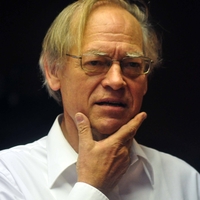Keep reading this paper — and 50 million others — with a free Academia account
Used by leading Academics

Eckart Otto
Ludwig-Maximilians-Universität München

Beth Stovell
Ambrose University

David Deavel
University of St. Thomas, Houston

Brent A . Strawn
Duke University
Related Papers
LUSKLARITA MEHA, 2023
. Dalam organisasi sektor publik,penganggaran merupakan
suatu proses politik. Hal tersebut berbeda dengan penganggaran pada sektor swasta yang relatif
kecil nuansa politiknya. Pada sektor swasta, anggaran merupakan bagian dari rahasia perusahaan
yang tertutup untuk publik, namun sebaliknya pada sektor publik anggaran justru harus
diinformasikan kepada publik untuk dikritik, didiskusikan dan diberi masukan. Anggaran sektor
publik merupakan instrumen akuntabilitas atas pengelolaan dana publik dan pelaksanaan programprogram yang dibiayai dengan uang publik.
Download
Solve Fluid Flow Challenges with
Field-Tested Advice
Learn how to make the most of your capabilities with SOLIDWORKS Flow Simulation
Download
What is singular and what is plural in Baltic art histories? Which questions are raised and how are they solved by art historians? What kind of re-and preferences do art histories make? What are the roles that art histories assume in inter-and cross-disciplinary projects, networks, and everyday realities? What voices do Baltic art histories have locally, regionally, and globally? (Or are they reserved to observing and listening?) How do art histories respond to or shape research policies? What are professional and civic priorities of art historians? These and similar questions usually addressed during breaks of scholarly conferences and sometimes noted in assessments drafts, call for in-depth discussion with an aim at identifying disciplinary roles, bonds, outputs, challenges, expectations, and potentials. Taking this inside-out format, the conference focuses on Baltic art histories as practised and reflected by art historians and invites submissions for 20-minute papers from doctoral students, scholars, curators, academics and researchers. In addition to thematic panels, the conference will hold two round table discussions dedicated to current situation and perspectives of art history.
Download
In versus narratives Sherlock Holmes is fighting or otherwise engaging Jack the Ripper. These texts pit the archetypal detective against the archetypal serial killer using established formulas as well as new narrative and generic features, a combination that results in their mass appeal among authors and audiences alike. The list of primary sources includes 120 titles – novels, short stories, plays, fanfiction, ‘Grand Game’ studies, movies, TV shows, video and board games – which are treated as a dialogic network of transfictional and transmedial texts. This study unpacks the versus corpus in its media dispersal by analysing Sherlock Holmes and Jack the Ripper as serial figures and culture-texts emphasising the increasing palimpsestousness of the former and the multidirectional polymorphousness of the latter, and tracing the overlapping Doylean culture-text. It also addresses the way character constellations are represented, negotiated, and fed back into the versus network, contextualising them within the coalescence of fact and fiction, Gothic and crime fiction frames, cultural memory, neo-Victorianism, and biofiction.
Download
学历证书电子版加拿大西三一大学留信认证毕业证书印刷品《微信95270640》学历认证怎么做:原版仿制加拿大西三一大学电子版成绩单毕业证认证《加拿大西三一大学毕业证成绩单》、加拿大西三一大学文凭证书成绩单复刻offer录取通知书、购买TWU圣力嘉学院本科毕业证、《加拿大西三一大学毕业证办理TWU毕业证书哪里买》、加拿大西三一大学 Offer在线办理TWU Offer加拿大西三一大学Bachloer Degree。
◆◆◆◆◆ — — — 归国服务中心 — — -◆◆◆◆◆
【主营项目】
一.毕业证、成绩单、使馆认证、教育部认证、雅思托福成绩单、学生卡等!
二.真实使馆公证(即留学回国人员证明,不成功不收费)
三.真实教育部学历学位认证(教育部存档!教育部留服网站永久可查)
四.办理各国各大学文凭(一对一专业服务,可全程监控跟踪进度)
国外毕业证、学位证、成绩单办理流程:
1、客户提供办理信息:姓名、生日、专业、学位、毕业时间等(如信息不确定可以咨询顾问:【微信95270640】我们有专业老师帮你查询);
2、开始安排制作毕业证、成绩单电子图;
3、毕业证、成绩单电子版做好以后发送给您确认;
4、毕业证、成绩单电子版您确认信息无误之后安排制作成品;
5、成品做好拍照或者视频给您确认;
6、快递给客户(国内顺丰,国外DHL、UPS等快读邮寄)。
专业服务,请勿犹豫联系我!本公司是留学创业和海归创业者们的桥梁。一次办理,终生受用,一步到位,高效服务。详情请在线咨询办理,欢迎有诚意办理的客户咨询!洽谈。
◆招聘代理:本公司诚聘英国、加拿大、澳洲、新西兰、加拿大、法国、德国、新加坡各地代理人员,如果你有业余时间,有兴趣就请联系我们咨询【微信95270640】
没文凭怎么找工作。让您回国发展信心十足!
★、真实教育部学历学位认证;(一对一专业服务,可全程监控跟踪进度)
★、真实使馆认证,可以通过大使馆查询确认;(即教育部留服认证,不成功不收费)
★、毕业证、成绩单等材料,从防伪到印刷、水印到钢印烫金,高精仿度都是跟学校原版100%相同的;(敬请放心使用)
★、可以提供钢印、水印、烫金、激光防伪、凹凸版、最新版的毕业证、百分之百让您绝对满意、
★、印刷,DHL快递毕业证、成绩单7个工作日,真实大使馆教育部认证1个月。为了达到高水准高效率。
Download
BioImpacts, 2017
Download
Global Journal of Management and Business Research, 2017
Various studies have explored the concept of staff reward and recognition schemes and the effect they have on staff motivation and performance. Attention has also been given to how these programs contribute to the overall realization of organizational goals. This study was conducted to determine the effects of reward and recognition on employee job performance in Kenyatta University. Moreover, the relationship between other factors affecting performance (working environment and leadership styles) and performance was also explored with the help of responses collected from employees working in Kenyatta University main campus, Nairobi. A descriptive research design was used in the investigation of the effects of rewards and recognition on Kenyatta University staff performance. Stratified random sampling and purposive random sampling were used in sampling design.
Download
Most Popular Electronic City Escorts With Photos and Phone No 9900341264 Near Me
Hi Guys! I Am Jiya My WhatsApp No. 9900341264 Are you searching for #ka15 beautiful Bangalore Call Girls? Check out here for adult classified ads for High-class Bangalore call girl, services available 24/7. Independent Call Girls Bangalore knows how to please their clients and will always strive to exceed their expectations.
Download
心理学专业伊利诺伊大学厄巴纳-香槟分校没毕业>办理伊利诺伊大学厄巴纳-香槟分校毕业证成绩单【微信UIUC】UIUC毕业证成绩单UIUC学历证书UIUC文凭《UIUC毕业套号文凭网认证伊利诺伊大学厄巴纳-香槟分校毕业证成绩单》《哪里买伊利诺伊大学厄巴纳-香槟分校毕业证文凭UIUC成绩学校快递邮寄信封》《开版伊利诺伊大学厄巴纳-香槟分校文凭》UIUC留信认证本科硕士学历认证
办国外伊利诺伊大学厄巴纳-香槟分校伊利诺伊大学厄巴纳-香槟分校本科学位证成绩单教育部学历学位认证留信认证大使馆认证留学回国人员证明修改成绩单信封申请学校offer录取通知书在读证明offer letter。
快速办理高仿国外毕业证成绩单:
1伊利诺伊大学厄巴纳-香槟分校毕业证+成绩单+留学回国人员证明+教育部学历认证(全套留学回国必备证明材料给父母及亲朋好友一份完美交代);
2雅思成绩单托福成绩单OFFER在读证明等留学相关材料(申请学校转学甚至是申请工签都可以用到)。
3.毕业证 #成绩单等全套材料从防伪到印刷从水印到钢印烫金高精仿度跟学校原版100%相同。
专业服务请勿犹豫联系我!联系人微信号:95270640诚招代理:本公司诚聘当地代理人员如果你有业余时间有兴趣就请联系我们。
国外伊利诺伊大学厄巴纳-香槟分校伊利诺伊大学厄巴纳-香槟分校本科学位证成绩单办理过程:
1客户提供办理信息:姓名生日专业学位毕业时间等(如信息不确定可以咨询顾问:我们有专业老师帮你查询);
2开始安排制作毕业证成绩单电子图;
3毕业证成绩单电子版做好以后发送给您确认;
4毕业证成绩单电子版您确认信息无误之后安排制作成品;
5成品做好拍照或者视频给您确认;
6快递给客户(国内顺丰国外DHLUPS等快读邮寄)。
Download
Mathematical Methods in The Applied Sciences, 2018
Download
学位认证 办理澳洲悉尼科技大学毕业证成绩单(QQ=微信95270640)毕业证学历认证OFFER专卖国外文凭学历学位证书办理澳洲文凭|澳洲毕业证,澳洲学历认证,澳洲成绩单 澳洲offer,教育部学历认证及使馆认证永久可查 ,国外毕业证|国外学历认证,国外学历文凭证书 UTS毕业证,UTS毕业证,UTS毕业证,UTS毕业证,UTS毕业证,UTS毕业证,UTS毕业证,专业为留学生办理毕业证、成绩单、使馆留学回国人员证明、教育部学历学位认证、录取通知书、Offer、
专业为留学生办理澳洲悉尼科技大学澳洲悉尼科技大学硕士毕业证成绩单【100%存档可查】留学全套申请材料办理。本公司承诺所有毕业证成绩单成品全部按照学校原版工艺对照一比一制作和学校一样的羊皮纸张保证您证书的质量!
如果你回国在学历认证方面有以下难题请联系我们我们将竭诚为你解决认证瓶颈
1所有材料真实但资料不全无法提供完全齐整的原件。【如:成绩单丶毕业证丶回国证明等材料中有遗失的。】
2获得真实的国外最终学历学位但国外本科学历就读经历存在问题或缺陷。【如:国外本科是教育部不承认的或者是联合办学项目教育部没有备案的或者外本科没有正常毕业的。】
3学分转移联合办学等情况复杂不知道怎么整理材料的。时间紧迫自己不清楚递交流程的。
如果你是以上情况之一请联系我们我们将在第一时间内给你免费咨询相关信息。我们将帮助你整理认证所需的各种材料.帮你解决国外学历认证难题。
国外澳洲悉尼科技大学澳洲悉尼科技大学硕士毕业证成绩单办理方法:
1客户提供办理信息:姓名生日专业学位毕业时间等(如信息不确定可以咨询顾问:我们有专业老师帮你查询澳洲悉尼科技大学澳洲悉尼科技大学硕士毕业证成绩单);
2开始安排制作澳洲悉尼科技大学毕业证成绩单电子图;
3澳洲悉尼科技大学毕业证成绩单电子版做好以后发送给您确认;
4澳洲悉尼科技大学毕业证成绩单电子版您确认信息无误之后安排制作成品;
5澳洲悉尼科技大学成品做好拍照或者视频给您确认;
6快递给客户(国内顺丰国外DHLUPS等快读邮寄)。
Download
Revista de Estudios Sociales, 2004
Download
Ciencia nicolaita, 1991
¿Cuál es el porvenir de la filosofía, cuál es la filosofía del porvenir? Este juego de palabraseste quiasmo-conjuga diversos significados y temas. En primer lugar, "el porvenir de la filosofía" nos plantea la cuestión de la supervivencia de la filosofía en los tiempos que vienen. En segundo lugar, "la filosofía del porvenir" es una frase ambigua: refiere tanto a una reflexión prospectiva sobre la filosofía que habrá en el futuro como a una reflexión actual que hace del concepto de porvenir, de futuro, una categoría o tema filosófico primordial. 1 De ahí que, y volviendo a la primera frase, "el porvenir de la filosofía" pueda ser entendida de una manera que quizá suene en un primer momento exagerada: que el porvenir pertenece a la filosofía, que, al menos en un cierto aspecto o sentido de la expresión, el porvenir "es" de quien filosofa. Jugaremos a continuación con estos diversos momentos y significados, que apuntan todos a la cuestión del concepto y las posibilidades de la actividad filosófica hoy día.
Download
国外大学文凭办理《贩卖英国赫瑞瓦特大学毕业证成绩单》《Q微信/1954292140》学历认证留学:原版定做赫瑞瓦特大学学历证书研究生学位证书《英国赫瑞瓦特大学毕业证成绩单》、英国赫瑞瓦特大学毕业证书与成绩单样本图片、原版赫瑞瓦特大学毕业证样本、《赫瑞瓦特大学毕业证》、赫瑞瓦特大学文凭学位证书原版定做在线制作英国英国赫瑞瓦特大学 Degree Certificate赫瑞瓦特大学Master Degree。
《英国文凭学位证书在线制作赫瑞瓦特大学毕业证封套》Q微-1954 292 140《英国赫瑞瓦特大学毕业证封套原版定做》如已删请点开网页快照,办理赫瑞瓦特大学真实教育部学位认证,国外假文凭成绩单,假学历,假毕业证,国外假文凭找工作!给家人看!
【留信认证的作用】:
1:该专业认证可证明留学生真实留学身份。
2:同时对留学生所学专业等级给予评定。
3:国家专业人才认证中心颁发入库证书
4:这个入网证书并且可以归档到地方
5:凡是获得留信网入网的信息将会逐步更新到个人身份内,将在公安部网内查询个人身份证信息后,同步读取人 才网入库信息。
6:个人职称评审加20分。
7:个人信誉贷款加10分。
8:在国家人才网主办的全国网络招聘大会中纳入资料,供国家500强等高端企业选择人才。
【回国证明的用途】:
《留学回国人员证明》《英国赫瑞瓦特大学研究生学位证书赫瑞瓦特大学文凭学位证书定做》【Q/微1954292140】《在线制作英国赫瑞瓦特大学毕业证封套研究生学位证书》是国家为了鼓励留学人员回国发展的一项优待政策,留学人员持有此证明,可以享受购买汽车免税,在国内证明留学身份、联系工作、创办企业、大城市落户口、创业申请国内各类基金等多项优惠政策。
留学服务中心:实体公司,注册经营,行业标杆,精益求精!咨询顾问:QQ/微信:1954292140
为留学生提供以下服务:
★真实教育部认证,教育部存档,中国教育部留学服务中心认证(即教育部留服认证)网站100%可查;
★真实使馆认证(即留学人员回国证明),使馆存档可通过大使馆查询确认;
★留信网认证,国家专业人才认证中心颁发入库证书,留信网永久存档可查;
★《原版定做赫瑞瓦特大学毕业证封套》【Q/微1954292140】《英国赫瑞瓦特大学研究生学位证书定做》毕业证、成绩单等全套材料,从防伪到印刷,从水印到钢印烫金,高精仿度跟学校原版100%相同;
【真实可查】---【永久存档】---【安全可靠】---【值得信赖】
出国留学对于大家来说是很吸引人的,不仅可以见识不同的风景,体验不同的文化。还可以拿到国外《原版定做赫瑞瓦特大学毕业证封套》【Q/微1954 292 140】《英国赫瑞瓦特大学研究生学位证书定做》的文凭。但是在国外留学没有大家想象的那么容易,大学的政策也跟国内不一样,所以很多留学生后面都拿不到《英国文凭学位证书在线制作赫瑞瓦特大学毕业证封套》【Q/微1954 292 140】《定做赫瑞瓦特大学研究生学位证书》文凭学历学位认证?虽然去留学的学生一直以来都很多,但并不是所有的留学生都能够拿到《英国赫瑞瓦特大学毕业证封套原版定做》【Q/微1954 292 140】《在线制作赫瑞瓦特大学文凭学位证书》毕业证的。根据研究报告显示留学的学生中只有50%能够成功完成本科课程毕业。在这种宽进严出的政策影响下,很多留学生都不能适应。那么下面就为大家详细介绍一下因为违反校规被开除还可以办理《英国赫瑞瓦特大学研究生学位证书赫瑞瓦特大学文凭学位证书定做》【Q/微1954 292 140】《在线制作英国赫瑞瓦特大学毕业证封套研究生学位证书》学历认证吗?
Download














